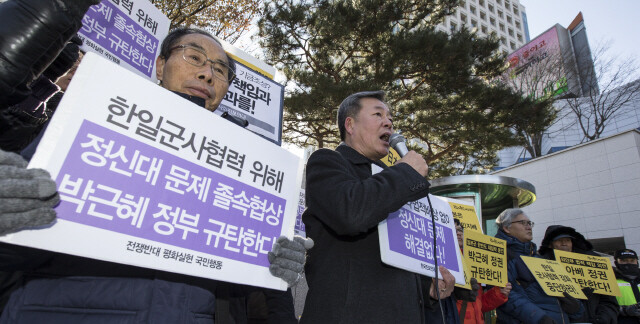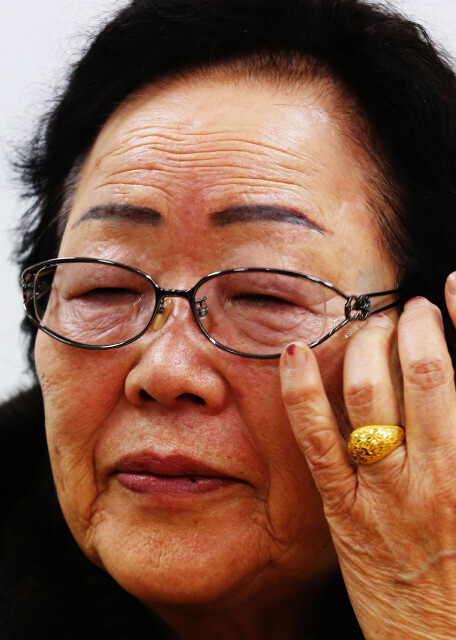hankyoreh
Links to other country sites 다른 나라 사이트 링크
Diverse interests paved the way for historic comfort women agreement

With the meeting between the foreign ministers of South Korea and Japan on Dec. 28 leading to a breakthrough in negotiations on the issue of the so-called comfort women change is on the horizon for relations between South Korea and Japan, despite mixed views on what changes the agreement will bring.
But with the former comfort women - women who were forced to serve as sex slaves for the Imperial Japanese Army - and civic groups opposed to the deal, the direction of public opinion has become an important variable affecting progress in relations between the two countries.
During an address to the Korean people on Monday afternoon, South Korean President Park Geun-hye asked Koreans, and the former comfort women in particular, to focus on the larger goal of improving South Korea’s relations with Japan. Park emphasized once more that this was a “final and irreversible settlement” to the comfort women issue, presuming that Japan fulfills its half of the bargain.
On Monday evening Japanese Prime Minister Shinzo Abe called Park on the telephone and expressed an “apology to the former comfort women and his feelings of remorse,” while reaffirming that the issue had been finally and irreversibly resolved.
This dramatic gesture - a personal phone call from the Japanese Prime Minister to the South Korean President - is thought to be an indirect expression of the Japanese government’s responsibility. The question of whether Japan would acknowledge legal responsibility for the comfort women system has been a major obstacle to resolving the issue.
During Park’s summit meeting with Abe, which was held in Seoul at the beginning of November, the two agreed to accelerate talks to resolve the comfort women issue as early as possible, bearing in mind the fact that this year is the 50th anniversary of the normalization of relations between South Korea and Japan. During the summit, Abe reportedly said several times that this year would bring a close to the comfort women issue while repeatedly emphasizing the need for progress in bilateral relations.
Once both governments had reached a consensus about wrapping up the issue by the end of the year, South Korea’s Blue House Chief of

Staff Lee Byung-kee and Japan’s National Security Advisor Shotaro Yachi initiated closed-door negotiations through a telephone hotline. The final agreement was reportedly reached during a meeting between the directors general from the two foreign ministries on Sunday.
The reason that President Park had been pushing to resolve the comfort women issue by the year’s end was reportedly motivated by a number of factors, including South Korea’s alliance with the US and its economic dependence on Japan.
Because the historical dispute between South Korea and Japan interfered with American plans to form a trilateral alliance with South Korea and Japan, the US had taken every opportunity to urge the two countries to settle their differences about the comfort women. The South Korean government also appears to have concluded that it was impractical to continue waging this historical war, given the diplomatic isolation that could result as Japan strengthens its alliance with the US and works with China to normalize their bilateral relations.
Another major factor that reportedly impelled the breakthrough in negotiations about the comfort women was concerns that continued to be raised that the deterioration of South Korea’s relations with Japan was wreaking havoc on the economy in the areas of trade, investment, and tourism.
The resolution of the comfort women issue - the biggest challenge facing South Korea’s relations with Japan - is fueling predictions that the two countries will begin moving toward d?tente.
Last month, South Korea and Japan held their first summit meeting since Park took office; Park and Abe might meet again, pundits suggest, during the Nuclear Security Summit (NSS), which will take place in the US next March.
However, public opposition to the outcome of the negotiations - including a backlash from civic groups - is an issue that the South Korean government still needs to address. If Park is unable to win over the former comfort women and the civic groups, who are strongly opposed to the deal, hostility toward Japan could backfire against the South Korean government.
Such a dispute between the South Korean government and civic groups could create domestic strife over the comfort women agreement that would likely have a negative effect on efforts to make progress in bilateral relations.
By Choi Hye-jeong, staff reporter

Editorial・opinion
![[Column] Park Geun-hye déjà vu in Yoon Suk-yeol [Column] Park Geun-hye déjà vu in Yoon Suk-yeol](https://flexible.img.hani.co.kr/flexible/normal/500/300/imgdb/original/2024/0424/651713945113788.jpg) [Column] Park Geun-hye déjà vu in Yoon Suk-yeol
[Column] Park Geun-hye déjà vu in Yoon Suk-yeol![[Editorial] New weight of N. Korea’s nuclear threats makes dialogue all the more urgent [Editorial] New weight of N. Korea’s nuclear threats makes dialogue all the more urgent](https://flexible.img.hani.co.kr/flexible/normal/500/300/imgdb/original/2024/0424/7317139454662664.jpg) [Editorial] New weight of N. Korea’s nuclear threats makes dialogue all the more urgent
[Editorial] New weight of N. Korea’s nuclear threats makes dialogue all the more urgent- [Guest essay] The real reason Korea’s new right wants to dub Rhee a founding father
- [Column] ‘Choson’: Is it time we start referring to N. Korea in its own terms?
- [Editorial] Japan’s rewriting of history with Korea has gone too far
- [Column] The president’s questionable capacity for dialogue
- [Column] Are chaebol firms just pizza pies for families to divvy up as they please?
- [Column] Has Korea, too, crossed the Rubicon on China?
- [Correspondent’s column] In Japan’s alliance with US, echoes of its past alliances with UK
- [Editorial] Does Yoon think the Korean public is wrong?
Most viewed articles
- 1‘We must say no’: Seoul defense chief on Korean, USFK involvement in hypothetical Taiwan crisis
- 2N. Korean delegation’s trip to Iran shows how Pyongyang is leveraging ties with Moscow
- 3Amnesty notes ‘erosion’ of freedom of expression in Korea in annual human rights report
- 4‘Weddingflation’ breaks the bank for Korean couples-to-be
- 5[Reportage] On US campuses, student risk arrest as they call for divestment from Israel
- 6[Column] Park Geun-hye déjà vu in Yoon Suk-yeol
- 7Korea sees more deaths than births for 52nd consecutive month in February
- 8Will NewJeans end up collateral damage in internal feud at K-pop juggernaut Hybe?
- 9[Guest essay] The real reason Korea’s new right wants to dub Rhee a founding father
- 10[Editorial] New weight of N. Korea’s nuclear threats makes dialogue all the more urgent